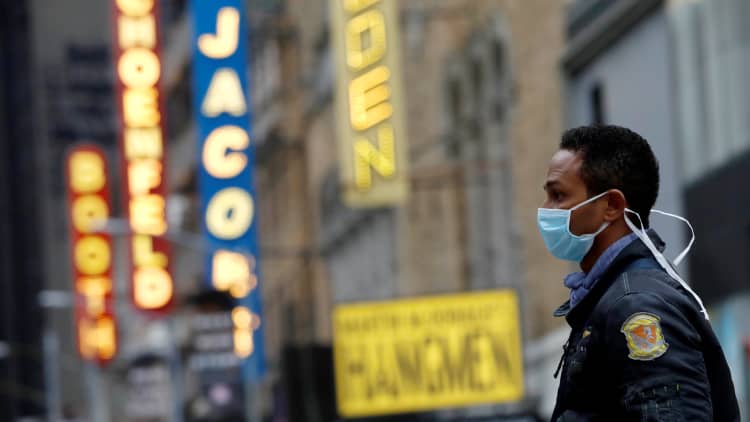Workers around the world are being impacted by the coronavirus, and many are choosing — or are required — to work from home as governments take drastic steps to curb the pandemic. However, not all workers have been given this privilege, or simply cannot do their jobs remotely, and now are left wondering if they have to prioritize a paycheck over their health.
One concern holding workers back from staying home is the fear that they could be fired if they don't physically show up at work.
While new legislation expands the number of workers who are guaranteed paid time off while confronting coronavirus, workers are not guaranteed the right to work from home — even if public health officials recommend it. And for workers with jobs deemed essential and who have no access to paid leave, including many grocery store workers, staying home can put them in danger of being fired.
CNBC Make It spoke with an employment attorney to determine what protections workers have while confronting coronavirus.
New legislation guarantees paid time off for some — but not the right to work from home
Last week, President Donald Trump signed new federal legislation into law which includes changes to the paid sick leave requirements included in the Family and Medical Leave Act (FMLA).
The bill provides free coronavirus screening, paid leave and enhanced unemployment insurance benefits for some people affected by COVID-19.
"This new law does not provide a new right to work from home," David Barron, labor and employment attorney with Cozen O'Connor, explains to CNBC Make It. However, it does extend paid leave for those impacted by coronavirus.
Specifically, the law requires employers with fewer than 500 employees and public agencies to provide 80 hours of paid sick leave if full-time employees are unable to work because they're subject to quarantine or isolation, are caring for someone who is in quarantine or isolation, have children in schools that have closed and/or are experiencing symptoms themselves. Part-time employees who are impacted are guaranteed as many hours of paid time off as they typically work over a two-week period.
The new legislation marks the first time the U.S. has provided federally mandated paid leave, but it excludes the roughly 48% of private-sector workers who work for organizations with more than 500 employees.
The amount workers on leave will be paid depends on their reason for taking time off. Workers who are sick will earn the full amount they are typically paid, up to $511 per day. Workers taking care of a sick family member or a child whose school or daycare is closed will earn two-thirds of what they are typically paid, up to $200 per day.
The new law goes into effect on April 2.
It depends on disability status and industry
While the latest coronavirus legislation does not guarantee Americans the right to work from home, workers whose health may be at risk due to coronavirus can likely ask for accommodations, depending on what their job entails, thanks to the Americans with Disabilities Act.
"Even before this new law, employees concerned about a safe workplace may have had the ability to refuse to work under OSHA laws," Barron says, explaining the rules set in place by the Occupational Safety and Health Administration of the Department of Labor. "Similarly, employees with underlying medical conditions that make coming to work dangerous may be entitled to work from home or take a leave as a reasonable accommodation."
People with asthma, lung conditions, diabetes and compromised immune systems, as well as anyone over the age of 60, are among those who may have the right to request to work from home, including in states that have not yet called for residents to shelter in place.
"In my world, there's really nothing different about someone who asks for some modification to their work schedule for other reasons versus the coronavirus," Barron explains. "It's the same analysis, which is, is it reasonable? And if you have the ability to let somebody work from home, if it's not going to be an undue hardship on the company and if there's a medical reason why they would be at risk, I think it's going to be really hard for employers legally to say 'no.'"
Some jobs can't be done from home
The question of ability and "undue hardship" is particularly relevant for workers who must be physically present at work to complete their jobs — such as those in the service industry. Under current law, workers must be able to complete their "essential functions" remotely in order to ask for accommodations to work from home.
According to an analysis by The New York Times, service workers are among those most at risk of exposure to coronavirus, and they are also among those least likely to have access to sick leave.
"For some jobs, the essential duties can only be performed in the workplace," reads the EEOC's guidance on telecommuting. "For example, food servers, cashiers and truck drivers cannot perform their essential duties from home."
Because they cannot logistically work from home, service workers may need to rely on paid time off, whether already provided by their employer or guaranteed by the new federal regulations.
"Organizations that can provide [work from home] options for their employees, I think that's a good thing to do," Alexander Colvin, a labor and employment researcher and dean of Cornell University's Industrial and Labor Relations School tells CNBC Make It. "But the reality is that there are lot of workers who won't have that option, and we need to be concerned about their situation."
Indeed, coronavirus has highlighted the inequality of who can — and cannot — work from home. According to data from the Bureau of Labor Statistics, workers with high wages as well as those who have completed a bachelor's degree or more, are significantly more likely to telecommute.

Location matters
Another factor to consider is geography.
State and local laws providing protections for workers vary significantly. Furthermore, many states and cities are taking different approaches to how they handle the pandemic.
On Friday, New York Gov. Andrew Cuomo ordered nonessential businesses to keep 100% of their workforce at home. The same day, Illinois Gov. Jay Pritzker announced a statewide "stay-at-home" order. This, however, is not the case across the country as each state approaches coronavirus differently.
Whether or not employers can force workers to use their allotted vacation days before they receive paid sick leave also varies by state.
Fortunately, the latest federal coronavirus legislation "specifically prohibits employers from requiring employees to first exhaust their PTO banks before using the new 10-day entitlement" when it comes to medically necessary quarantining, says Barron.
But unless federal and state regulations and restrictions match up, some workers may still find themselves with fewer options than their neighbors who are able to wait out the pandemic at home.
Check out: The best credit cards of 2020 could earn you over $1,000 in 5 years
Don't miss:



